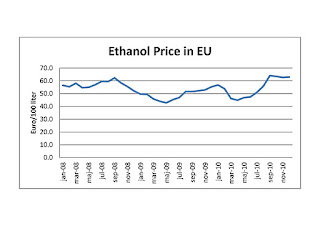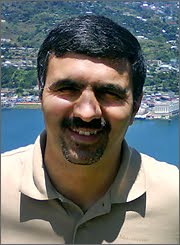Sunday, January 29, 2012
Reusing wastes in Göteborg
When talking about waste managements, usually we talk about 3Rs (reduce, reuse and recycle). Developing countries and poor countries are usually very good in reusing the wastes. However, people at the industrial countries are usually not so good in that aspects. This general rule is also valid in Sweden. However, since few years ago, Gothenburg (or Göteborg) which is a neighboring city of Borås, has started waste reusing in one of the recycling stations, named Alelyckan. In this station, when people bring the wastes, the personal ask them about the quality of the materials, if could be reused. If so, those wastes are separated to be sold again directly by the shop next to the center, or send to the charity organizations such as myrorna or the church stadsmissionen. I believe it is a good initiative and should be developed to several cities and all the waste recycling stations. Here are some photos from this center and their shops!





Monday, January 16, 2012
A PhD thesis on magic fungi
People have consumed the resources in the world for thousands of years and produced wastes. But, why we still have the resources? The fact is that the good bugs (bacteria and fungi) together with plants and animals recycle the materials we consume!
Zygomycetes are among the fungi that are relatively unknown. We have worked with these fungi since 1999, and are getting more and more interested. These fungi are saprophytes (means they like wastes to grow on), and produce many products such as ethanol, lactic acid, fumaric acid, etc., they produce different types of enzymes, while their biomass is also usefull. Hunders of million people in Indonesia have eaten these fungi every day in form of a food named tempe for hundreds of years. In addition, these fungi are good as fish feed or animal feed. They are probably one of the best friends to human, without we know about it!
We had previously several PhD theses on these fungi and now it is time for Patrik Lennartsson, to see if these fungi can help him to get a PhD :)
Patrik defends his thesis on 9 Februari this year.
Here is his thesis and some published articles and the link to download them:
PhD Thesis:
Zygomycetes and cellulose residuals: hydrolysis, cultivation and applications
Articles:
1-Effects of different growth forms of Mucor indicus on cultivation on dilute-acid lignocellulosic hydrolyzate, inhibitor tolerance, and cell wall composition
2-A pilot study on lignocelluloses to ethanol and fish feed using NMMO pretreatment and cultivation with Zygomycetes in an airlift reactor
3-Spent sulphite liquor for cultivation of an edible Rhizopus sp.
His other articles are on the way to be published!

(Dark field microscopy photograph of submerged growth of Mucor indicus. Photo by Patrik Lennartsson)
Zygomycetes are among the fungi that are relatively unknown. We have worked with these fungi since 1999, and are getting more and more interested. These fungi are saprophytes (means they like wastes to grow on), and produce many products such as ethanol, lactic acid, fumaric acid, etc., they produce different types of enzymes, while their biomass is also usefull. Hunders of million people in Indonesia have eaten these fungi every day in form of a food named tempe for hundreds of years. In addition, these fungi are good as fish feed or animal feed. They are probably one of the best friends to human, without we know about it!
We had previously several PhD theses on these fungi and now it is time for Patrik Lennartsson, to see if these fungi can help him to get a PhD :)
Patrik defends his thesis on 9 Februari this year.
Here is his thesis and some published articles and the link to download them:
PhD Thesis:
Zygomycetes and cellulose residuals: hydrolysis, cultivation and applications
Articles:
1-Effects of different growth forms of Mucor indicus on cultivation on dilute-acid lignocellulosic hydrolyzate, inhibitor tolerance, and cell wall composition
2-A pilot study on lignocelluloses to ethanol and fish feed using NMMO pretreatment and cultivation with Zygomycetes in an airlift reactor
3-Spent sulphite liquor for cultivation of an edible Rhizopus sp.
His other articles are on the way to be published!

(Dark field microscopy photograph of submerged growth of Mucor indicus. Photo by Patrik Lennartsson)
Wednesday, January 11, 2012
Green cars pool in Sweden
Sweden, as one of the most environmentally friendly contries, consumes today 47% renewable energy according to Swedish Energy Agency, while the rest is nuclear energy and fossil fules. The fossil oil is mainly consumed as fuel for the cars and trucks. There has been therefore a major effort to change the pattern of this branch. Ethanol was the first one introduced in Sweden in 2000 and it is now mixed with gasoline and also sold as 85% as E85 by almost all the gas stations. According to Bil Sweden, 304,984 new cars were registered in 2011, in which 122,460 cars were in the category of environmental cars. It means that 40.2% of the new cars were green cars.
However, among the green cars, there has been big fluctuations in the last few years. Ethanol was dominant a few years ago according to Gröna Bilisters. For exampe, 30% of the new green cars in 2010 were ethanol cars, which reduced to 12% last year. There are now many alternatives of low-consumimg green cars (producing less than 120 g CO2 per km) in the market, particularly diesel cars. It means in 2011, green diesel cars were dominants. However, the new incoming law with the harder definition of green cars, will further change the profile of the green cars in the coming years. The share of biogas cars is now more than 5%. Let's hope for the best development in this market!

(The percentage of newly registered green cars in Sweden in 2011. Complete list of the last few years is here)
However, among the green cars, there has been big fluctuations in the last few years. Ethanol was dominant a few years ago according to Gröna Bilisters. For exampe, 30% of the new green cars in 2010 were ethanol cars, which reduced to 12% last year. There are now many alternatives of low-consumimg green cars (producing less than 120 g CO2 per km) in the market, particularly diesel cars. It means in 2011, green diesel cars were dominants. However, the new incoming law with the harder definition of green cars, will further change the profile of the green cars in the coming years. The share of biogas cars is now more than 5%. Let's hope for the best development in this market!

(The percentage of newly registered green cars in Sweden in 2011. Complete list of the last few years is here)
Tuesday, January 10, 2012
2011: Political, economical, social and climate turbulences
2011 is now passed, a year with global turbulences in almost all the aspects, including politics in e.g. Middle East and North Africa, economics in Europe and USA, social in many countries and also the global climates. The global temperature in 2010 had a record high, but the warmest 13 years were in the last 15 years. Arctic sea ice got a record minimum of 4.33 million km2 in 2011, which is 35% below the average 1979-2000. We heard quite often about severe storms, cyclons, floods, drought, forest fires, and many other natural disasters everywhere in the world. The weather goes toward the extremes in all the aspects. We see for example drought followed by flood. The polititions in the world should wake up and do something! More information about 2001 can be found at World Meterological Organization.

(Global temperature from WMO)

(Global temperature from WMO)
Monday, January 2, 2012
Ethanol prices in EU
I wish you all had a happy holiday and happy new year, although this time is not a vacation time for all around the world. I am starting this year in my blog with ethanol prices in EU which was recently published as part of a large report from Swedish Energy Agency. Ethanol is the dominant biofuel in the global market and a lot of debates around it. Actually, anything new that comes to the market, bring new debates. I just add the price of ethanol here at the time being!


Subscribe to:
Posts (Atom)
This blog is dedicated to collect some interesting news and developments on biofuels, bioenergies, biomaterials and biological treatments of residuals and wastes, as well as my personal opinions in this field.



